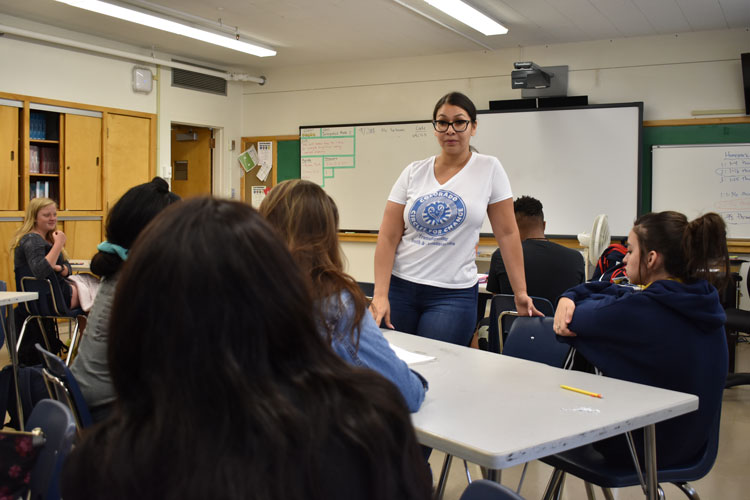
Angell Pérez explores the roles women and people of color have played in history with her students. photo by AJ Domagala.
Angell Pérez’s Women of Color class is changing the way Thomas Jefferson approaches diversity and racial equity.
In an era when tensions between races, religions, genders, and ethnicities are bursting at the seams, high school communities are left to ponder what they can do to create a counter-culture against the tumultuous social climate. As a majority-minority school, Thomas Jefferson is the home of many students who are vulnerable to the impact caused by current federal policies. A recent addition to the TJ community, racial justice and equity consultant Angell Pérez’s Women of Color class has already begun to change the way students approach matters of race and gender.
Returning for the 2018-2019 school year after a successful pilot last spring, the Women of Color class explores the often unrecognized history of women of color. Additionally, peers are endowed with skills that are in high demand for every class. Critical thinking, critical analysis, and comprehension of complex texts all have a major role in almost every period. The part women play in the past and present is unboxed, offering up the opportunity for students to realize their own potential.
“Racism is a very real thing in the lives of students of color. They experience it every single day,” expressed Pérez. With over 15 years of experience providing diversity, inclusiveness, and racial equity training to non-profit organizations, private businesses, and government agencies, as well as leading the work as an executive director, Pérez brought her skills to Thomas Jefferson High School to empower women of color. Pérez is also an adjunct professor of Gender & Women’s Sexuality Studies at Metropolitan State University of Denver (MSU). Her versatile profession spans the spectrum from introducing those who are beginning their understanding of race to the deeply advanced who wish to continue ongoing racial justice work. By adapting the training to a school setting, Pérez can apply her expertise on racial awareness to adolescents. “The class has shown that I have a lot more power than I thought and taught me to stand in that power,” remarked junior Bella Williams.
The course’s title does not denote who may enroll. Pérez explains that students of all backgrounds have a place in her classroom. “We are able to provide a class that allows students who are not of color to have a knowledge base and develop skills to help them stand in solidarity with students of color so that they can dismantle racism. I think that is really unique,” she stated. Alongside empowering girls of color, Pérez wants to build a culture that goes beyond inclusivity and diversity, a culture that is intentionally anti-racist. “That leaves a space for people of color to feel safe and show up as their best,” Pérez asserted.
“I have a sense of responsibility. . . to be able to support young people. What inspires me is seeing the hope that people have for a better world,” Pérez maintained about her motivation to make a change. As of this semester, the class has already doubled in size. The fifteen students of the 2018 spring semester ensured that word spread about the revolutionary class in room sixteen. With this year’s students already reaping the rewards of such apposite lessons, it is to be expected that demand for Women of Color enrollment will continue to snowball.
The nature of the course allows the cultivation of a bond more potent than could ever be built in a mainstream class. “We talk about issues that are very personal, but what happens in the class stays in the class,” Williams expressed. Though conventional curriculums for mathematics and language arts are vital for the modern-day student’s educational toolbox, programs that explore identity can be just as beneficial in preparing for post-primary ventures. TJ’s myriad of ethnicities cannot be ignored. Embracing the differences equips teens to better appreciate themselves and others.
Not only does the MSU Women of Color class strengthen the community, it also conforms to federal law. According to Title IX, “No person in the United States shall, on the basis of sex, be. . . denied the benefits of. . . any education program.” History classes that teach only to the glory of white men diminish their value to oppressed groups when they fail to provide representation. “I noticed that women are often left out of history and I wanted to learn more about their part in the past,” Williams expounded on her reasons for joining the class. By portraying the heterogeneous mix of cultures that have made their contributions to history candidly, Denver Public Schools can rework the oppressive education system that has subordinated women and people of color for decades.
The Women of Color class meets every Monday, Wednesday, and Friday during eighth period, and students receive college credit for successful completion of the course. Those interested in trying this innovative class for the 2019 semester may speak with their counselors. Taking part in such a phenomenal class would contribute to a larger goal that would benefit the entire TJ student body. “We have diversity, but do we have a place where everyone can thrive?” questioned Pérez.